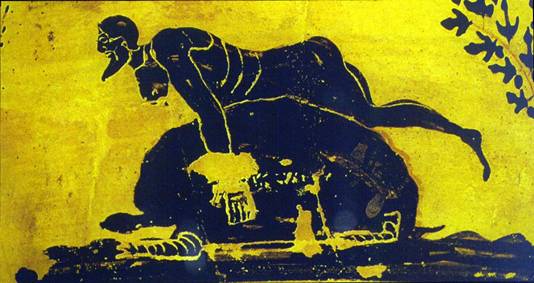from Dylan's Nobel Prize speech:
http://www.nobelprize.org/nobel_prizes/literature/laureates/2016/dylan-lecture.html
The Odyssey is a great book whose themes have worked its way into the ballads of a lot of songwriters: "Homeward Bound, "Green, Green Grass of Home," "Home on the Range," and my songs as well.
The Odyssey is a strange, adventurous tale of a grown man trying to get home after fighting in a war. He's on that long journey home, and it's filled with traps and pitfalls. He's cursed to wander. He's always getting carried out to sea, always having close calls. Huge chunks of boulders rock his boat. He angers people he shouldn't. There's troublemakers in his crew. Treachery. His men are turned into pigs and then are turned back into younger, more handsome men. He's always trying to rescue somebody. He's a travelin' man, but he's making a lot of stops.
He's stranded on a desert island. He finds deserted caves, and he hides in them. He meets giants that say, "I'll eat you last." And he escapes from giants. He's trying to get back home, but he's tossed and turned by the winds. Restless winds, chilly winds, unfriendly winds. He travels far, and then he gets blown back.
He's always being warned of things to come. Touching things he's told not to. There's two roads to take, and they're both bad. Both hazardous. On one you could drown and on the other you could starve. He goes into the narrow straits with foaming whirlpools that swallow him. Meets six-headed monsters with sharp fangs. Thunderbolts strike at him. Overhanging branches that he makes a leap to reach for to save himself from a raging river. Goddesses and gods protect him, but some others want to kill him. He changes identities. He's exhausted. He falls asleep, and he's woken up by the sound of laughter. He tells his story to strangers. He's been gone twenty years. He was carried off somewhere and left there. Drugs have been dropped into his wine. It's been a hard road to travel.
In a lot of ways, some of these same things have happened to you. You too have had drugs dropped into your wine. You too have shared a bed with the wrong woman. You too have been spellbound by magical voices, sweet voices with strange melodies. You too have come so far and have been so far blown back. And you've had close calls as well. You have angered people you should not have. And you too have rambled this country all around. And you've also felt that ill wind, the one that blows you no good. And that's still not all of it.
When he gets back home, things aren't any better. Scoundrels have moved in and are taking advantage of his wife's hospitality. And there's too many of ‘em. And though he's greater than them all and the best at everything – best carpenter, best hunter, best expert on animals, best seaman – his courage won't save him, but his trickery will.
All these stragglers will have to pay for desecrating his palace. He'll disguise himself as a filthy beggar, and a lowly servant kicks him down the steps with arrogance and stupidity. The servant's arrogance revolts him, but he controls his anger. He's one against a hundred, but they'll all fall, even the strongest. He was nobody. And when it's all said and done, when he's home at last, he sits with his wife, and he tells her the stories.
. . . When Odysseus in The Odyssey visits the famed warrior Achilles in the underworld – Achilles, who traded a long life full of peace and contentment for a short one full of honor and glory – tells Odysseus it was all a mistake. "I just died, that's all." There was no honor. No immortality. And that if he could, he would choose to go back and be a lowly slave to a tenant farmer on Earth rather than be what he is – a king in the land of the dead – that whatever his struggles of life were, they were preferable to being here in this dead place.
That's what songs are too. Our songs are alive in the land of the living. But songs are unlike literature. They're meant to be sung, not read. The words in Shakespeare's plays were meant to be acted on the stage. Just as lyrics in songs are meant to be sung, not read on a page. And I hope some of you get the chance to listen to these lyrics the way they were intended to be heard: in concert or on record or however people are listening to songs these days. I return once again to Homer, who says, "Sing in me, oh Muse, and through me tell the story."







